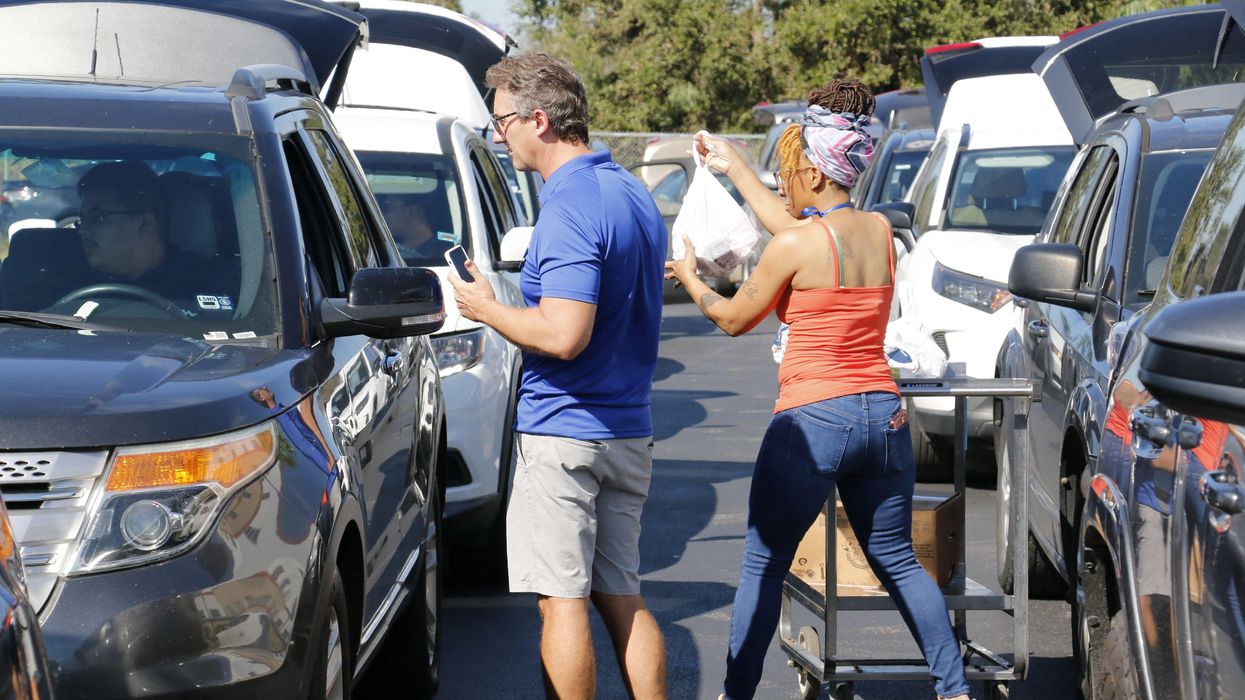LeMieux runs e.pluribus.US, which conceives of, builds and tests interventions to scalably improve public attitudes toward working with political opponents.
A Haitian nurse tends to hurricane victims. A California aid worker steadies still shaken survivors. A Thai volunteer assembles cots, replacing beds lost to the sea. A Jewish meals coordinator nourishes refugeesf air-lifted from the war zone. A Houstonian early-responder comforts those distraught at having lost everything to the flood. A Manhattan good Samaritan assists dust-covered victims, catatonic in that thousand-yard stare.
In this case, these scenes did not happen separately in Haiti, California, Thailand, the Middle East, Texas, nor New York City. These happened collectively, under one roof, this past Sunday afternoon in Ft. Myers.
All of these different “identities” were helping Floridians.
When Hurricane Harvey struck Texas in 2017 I was living in Manhattan. But I had grown up in Houston and still had masses of family and friends there, so I immediately returned to help. Much of my volunteering was at a huge Red Cross shelter downtown. I was struck by how volunteers came from all over the hemisphere, literally from New York to California, all across the Midwest and Mexico.
One guy had driven down alone from north of the Canadian border. Three women flew from Manhattan on a lark for the weekend, just to volunteer. (I initially recognized them due to their all-black attire and Chuck Taylors.) The security checkpoints at Houston’s Bush Intercontinental Airport were staffed that week by officers flown in by the San Francisco Police Department. There were Cruz Roja aid workers from Mexico City who ordinarily train for earthquake response. All helping Texans.
Those Texan people. In that red state.
On social media, yes, the more militantly progressive people in my Facebook feed insinuated Houston deserved this as comeuppance for red-state-driven, laissez-faire zoning failures. (These commenters apparently had never alighted in Houston long enough to learn it actually votes majority blue.) But there in the shelter, it was simply about people coming from everywhere — regardless of borders, tribes, ideologies, parties or income — to help other people in need.
Not long after Harvey, I moved from New York to Miami. And so there I was last month, as Hurricane Ian stormed through southwest Florida. It hit an area I know well and hold dear — Sanibel, Captiva, Boca Grande, Gasparilla. And I have maybe a dozen friends and family scattered across that coast. So again, the situation called out for me to go help. I pulled together my overstocked “kit” (I tend to over-prepare for the possibility zombies might attack while out on these “missions”), rented a big o’l honkin’ pickup truck to ford washes (also overkill) and trundled off to “the war zone.” This time, with my experience from Harvey, I knew exactly where to go and what to do and within minutes of arrival was plugged into the Red Cross effort at South Ft. Myers High School.
Quickly put to work ... (excitement!) ... assembling cots. Shelter work is actually pretty mundane. No zombies.
But — whop! whop! whop! —the Blackhawks repeatedly swooped in with survivors from the barrier islands, mostly Pine, Sanibel and Ft. Myers Beach. And we took care of them.
Very quickly I ran into the Houstonians. A Thai-American and a Jewish-American. The Red Cross had flown them in from Texas to assist with the effort and I was immediately struck by the irony that five years earlier I had flown to Houston to help with their hurricane, and now here was Houston flying to my state to help with our hurricane.
I then met the Haitian-American nurse, actually from Ft. Lauderdale, and couldn’t help but make the connection with all the disasters Haiti has suffered. Additional volunteers hailed from Irvine, Calif. — which someday will call us to come help with their earthquake — and about every other state you can imagine, each with its own unique form of someday-to-come apocalypse.
We humans, we have our tribes. Our opinions. Our interests and differences. Our dislikes. Our antipathies.
But it’s really damn clear, actually: On instinct, we know we need each other.
And despite what might come out of our mouths and emotions at other times, without hesitation we jump when these people that we otherwise view as opponents are in need. It sounds like a quaint, jingoistic concept but when you see a disaster response come together, you understand very clearly that when Americans fall, fellow Americans — from far and wide and irrespective of differences — are instantly there to pick each other up.
Why is that?
I think it’s because we know we need each other. For the same reason they need us, we know we will someday need them. Stubbornly secure inside us, though sometimes repressed, is our perhaps begrudging wisdom that we can’t do this thing alone, this thing called civilization (which is to say, anything worth arguing over).
People tell Americans we have become too divided, have antipathy toward one another, lack empathy for opponents’ situations and cannot solve problems with them.
I think we do know how to problem-solve across boundaries. I’ve seen it first-hand.
We just need to ask: Who is it that convinced us we can’t do it in politics?



















Trump & Hegseth gave Mark Kelly a huge 2028 gift